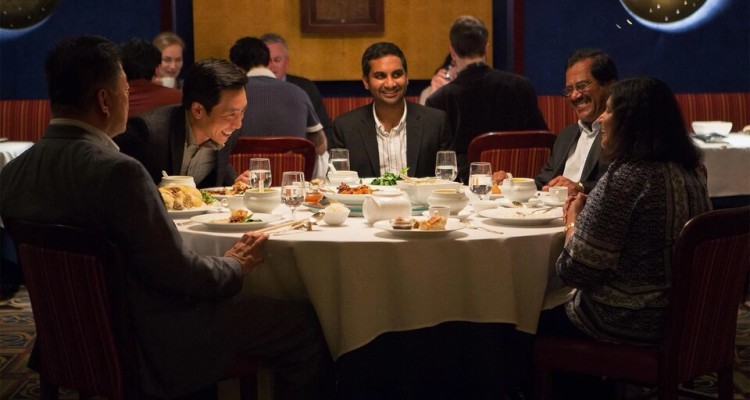
by Yanichka Ariunbold, assistant editor
A Netflix original series that you’ve probably heard of vaguely, Master of None was released just this past November and has garnered critical acclaim almost immediately. The show revolves around Dev Shah, a thirty-two year old actor whose most famous work is a GoGurt commercial, and his close friends. Dev is played by stand-up comedian and Parks and Recreation actor Aziz Ansari, which in and of itself has led to a flurry of high expectations for the show. Since its release, those high expectations have been turning into equally high, if not higher, praise for Master of None‘s offbeat humor and refreshing social commentary.
I admit, I wasn’t extremely invested in the show after watching “Plan B,” the first episode. In truth, the show’s restrained humor and quirky cinematography (both of which I learned to appreciate so much more later on) failed to amaze me, and I immediately started to question the show’s consistently above-average rating. But the second episode, “Parents,” blew me away — and then, goodbye to doing anything productive for the next six hours. Seriously, I was not prepared for the amount of laughter and tears (and sometimes, both at the same time) that erupted out of me as I progressed through the first and, sadly, only current season.
“You realize fun is a new thing, right? Fun is a luxury only your generation really has.”
— Dev’s father, “Parents”
“Parents,” like I said, was the episode that won me over completely. In it, Dev and his friend Brian (played by Kelvin Yu), two Americanized sons of immigrants, decide to have dinner together with both their respective parents in order to learn more about their pasts. In the beginning, Dev and Brian are wryly condescending. In the end, they’re still wryly condescending, just to a lesser degree and with more knowledge regarding the people who raised them.
The episode begins with the two thirty-ish year olds being pretty colossal, albeit unknowing, jerks to their parents: Dev not bothering to help his dad and mom with a computer problem, Brian refusing to do some small errand for his father — simple, effortless things that pale in comparison to the amount of sacrifice their parents had to make, as we would see in the flashbacks, so that they could live comfortably.
Flashback to each of the fathers’ tale of woe — both stories are marked by alienation, racism, economic mobility, and joy of fatherhood.
Back to the present, the fathers, smiling weakly, let their sons go watch the movie that they had obviously used as an excuse for getting out of spending time with their parents.
It’s absolutely heartbreaking.
This episode, like the show, is never outwardly, like, SAD-SAD-IN-YOUR-FACE-SAD; it possesses the dry humor that dominates the whole show. However, the emotional voice of the parents, as well as the second-generationers, is so expressive that I saw my own ungratefulness, carelessness, indifference being portrayed on the screen. It’s like I was there, like it was my own family that I was watching. I’ve never felt like that watching a TV show before. To my astonishment, I was overcome with feeling.
I’m the daughter of two immigrants, both of whom remind me from time to time (usually very gently) about how hard they’ve worked to give me the life they never had, so I did what probably every other guiltily unappreciative child did when they watched the episode: cried for a solid half-hour by myself, repeatedly hugged my parents (who were really confused), blubbered out unintelligible pleas for forgiveness about unintelligible things, and ran back into my room to watch some more of the show that made me more aware than ever of my luck in having, and gratitude towards, the two most important people in my life.
Dealing with cultural legacy isn’t the only issue the creators of the show (Ansari and Alan Yang) focus on. They explore the hypocrisy of the entertainment industry concerning people of color (“Indians on TV”); the misogyny that ruthlessly pervades society, inherent even in something as mundane as a barbecue commercial, and the needless objectification of women in any given setting (“Ladies and Gentlemen”); the view of the elderly as useless and acceptable only on the fringes of society (“Old People”); and the questionable necessity of adhering to the cycle of “growing up” that only includes marriage, kids, and a house (“Plan B,” “Finale”).
Furthermore, one of my favorite parts about the show is how Ansari got his actual parents to play his fictional parents in the show — so despite the fact that their acting isn’t Golden Globe-worthy, the dialogue between Dev and his parents is obviously authentic and really, really funny. They’re pretty awesome. Definitely another reason to watch.
Master of None is, in essence, the kind of show that says what everyone’s wondering in their mind, with, of course, a dash of its signature quirky humor. It’s unpredictable; it’s progressive — and it stands unflinchingly against the current of societal norms that have been called “norms” for too long.

